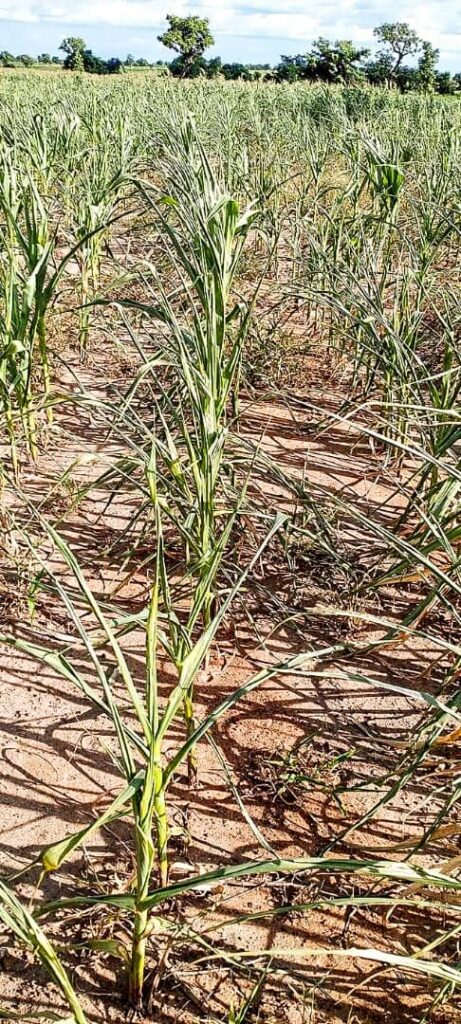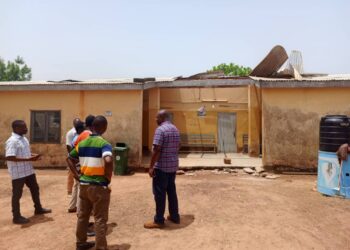Farmers in the northern part of Ghana are increasingly worried about a potential drought that could significantly threaten food security in the country. The prolonged absence of rains in major farming areas, particularly in the Upper West Region, has left crops wilting under the relentless heat of the sun.
This disturbing state of farms has sparked public outcry over the jeopardy of sustainable food security. In the Upper West Region, farmers typically cultivate crops like maize, cowpea, and groundnut per farming season.
Additionally, in a normal farming season, markets would experience an influx of fresh tomato, pepper, and okra, but these crops are currently scarce due to insufficient rainfall.
Despite the gravity of the situation, the government, particularly the Ministry of Food and Agriculture, has yet to make an official pronouncement on a possible intervention to alleviate fears about the impact of the drought.

Photo credit: Latif Lawrence Jorhowie
Some view this perceived inaction as a sign of insensitivity towards the agricultural sector, which is critical in ensuring food security. The lack of a response is seen as detrimental, especially given the severe agricultural crises that have affected other African countries such as Sudan, Somalia, and Chad.
Several factors are believed to contribute to the current predicament. Among them are deforestation for commercial purposes such as timber and charcoal burning, the massive expansion of agricultural lands, indiscriminate application of herbicides and pesticides, and urbanization, which leads to the destruction of tree cover and pollution of water bodies. These activities have collectively exacerbated the vulnerability of the land to drought conditions.
Some attribute the reasons for the drought to scientific causes, such as climate change and environmental degradation. However, others believe the desecration of the land by immoral acts, such as bloodshed, human sacrifices, and the failure to appease the gods, have angered the deities, resulting in the current crisis. There is also criticism of the traditional leaders’ inability to maintain their incorruptibility and uphold traditional practices that are believed to protect the land.
In Sisaala East Municipal, several farmers have voiced their concerns.
Borsutie Suglo expressed his fear of becoming indebted to companies that provided him with farming inputs, which they are now struggling to repay due to poor harvests.
Kanton Kamil, a teacher and farmer, has called on the government for compensation to cushion farmers, as their primary source of livelihood is under threat. He also emphasized the need for stricter enforcement of laws regulating deforestation and the protection of water bodies.
Another farmer in the Nabugujan community in Sisaala East Municipal, Nibormoka Tanko has called for the activation of agricultural insurance to cater for unforeseen circumstances like the current drought. He believes that such measures would provide much-needed relief and security for farmers facing similar challenges in the future.
The alarming state of the farms has also been highlighted on social media platforms such as Facebook, where disturbing images of wilting crops have been widely shared. These images reflect the dire situation and have drawn significant public attention and concern.
The crisis comes at a time when the cost of procuring farming inputs is beyond the reach of many farmers, especially those engaged in peasant and subsistence farming. The high cost of inputs has become a significant threat to the livelihood of many people in rural areas.
For instance, it is estimated that a farmer in the current economy needs at least GHC 3,000 to cultivate one acre of maize, assuming all other conditions are favorable. This amount is prohibitive for many farmers, further exacerbating their plight.
Many farmers in the Wa West District and the Sisaala areas have already started counting their losses. The state of their farms is almost impossible to recover, even if the rain patterns were to change suddenly. The loss of crops has severe implications not only for the farmers’ livelihoods but also for the broader food security of the region.
The situation calls for urgent government intervention and support. Farmers are calling for the implementation of policies and measures that would mitigate the impact of such droughts in the future. These measures include providing financial compensation to affected farmers, enforcing laws to protect the environment, and establishing agricultural insurance schemes.



















